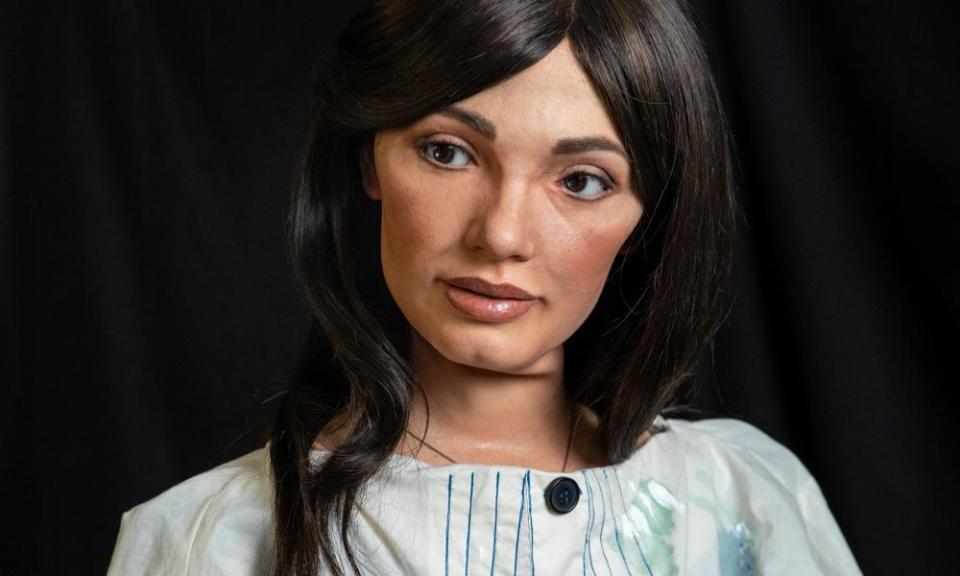Klara and the Sun by Kazuo Ishiguro review – what it is to be human

Klara and the Sun asks readers to love a robot and, the funny thing is, we do. This is a novel not just about a machine but narrated by a machine, though the word is not used about her until late in the book when it is wielded by a stranger as an insult. People distrust and then start to like her: “Are you alright, Klara?” Apart from the occasional lapse into bullying or indifference, humans are solicitous of Klara’s feelings – if that is what they are. Klara is built to observe and understand humans, and these actions are so close to empathy they may amount to the same thing. “I believe I have many feelings,” she says. “The more I observe the more feelings become available to me.”
Related: Klara and the Sun by Kazuo Ishiguro – read the world exclusive extract
Klara is an AF, or artificial friend, who is bought as a companion for 14-year-old Josie, a girl suffering from a mysterious, perhaps terminal illness. Klara is loyal and tactful, she is able to absorb difficulty and return care. Her role, as she describes it, is to prevent loneliness and to serve.
So we, the readers, love Klara the way we love what is good. We love her the way we loved our childhood teddy bear, perhaps, or even in the way we love a fictional character. Because even the most rounded fictional character is also a kind of animated doll; a code made out of language and the readers’ goodwill, which makes us smile or cry because we believe in it. The credulity of the reader is a hopeful and sometimes beautiful thing. Klara and the Sun captures this poignancy exactly – not because of the way people believe in Klara, but because of the way she starts to believe in the sun.
The themes of replication and authenticity are similar to those in Kazuo Ishiguro’s Never Let Me Go, published in 2005. Both novels are set in a speculative future that feels quite like the present. Both also contain a secret moral shift: an advance in technology that has changed people’s sense of what it is to be human, and the emotional punch of Klara, as with Never Let Me Go, comes from the fact that the central character doesn’t know what is going on.

At the start of the novel, we see Klara being moved into the window display of her store in the city in order to attract customers (Ishiguro makes this less pervy than it sounds), and she speaks in gentle tones about what she sees outside. Klara is already a little self-conscious, for a machine. She is also an exceptionally talented AF, because she is able to grasp emotional contradiction. Out in the street, a man and a woman see each other, perhaps for the first time in many years, and they embrace so tightly Klara wonders if they are more upset than delighted. “Sometimes,” her manager says, “at special moments like that, people feel a pain alongside their happiness.”
She has already seen Josie, the girl whose friend she instantly wants to become, but Josie has not come back to make the purchase. Klara must wait, which she does with great patience. Ishiguro is very interested in delay and restoration. Loneliness and waiting are almost the same thing here; estrangements and reunifications run through the book. Josie reconciles with her old friend Rick, she meets her separated father, and Rick’s mother makes contact with an old boyfriend, Vance. The promise is held out that those who wait will be rewarded, and sometimes they are. Other times, the reality is disappointing or even brutal, but win or lose, hope is such a sustaining thing that it becomes a value in itself. Hope, in the face of sickness and possible death, is what Klara does best.
We come to know more than Klara does, and this distance is the gentle opposite of irony – it is compassion
Meanwhile, the reader must learn to wait too, as with steady craft, Ishiguro leaves one hint after another. What is wrong with the world outside Klara’s store window? Why are the children she sees so thin? Why does the beggar man seem dead (along with his dog) and then alive again? What will happen when humans realise that the new upgraded series of AFs are capable of deceitfulness? The book rustles with possibility.
By the time we realise what is happening to the children, this first mystery has given way to the more urgent question of what Josie’s mother is planning for Klara. If you are waiting for a big sci-fi reveal about this future world then you are reading the wrong book, however. There is no great veil ripped from the narrative to reveal a conspiracy of machines, or of men. Social and political details come late, and make no difference to Klara. Slowly, however, our understanding of the world detaches from her naive point of view. We come to know more than Klara does, and this distance is the gentle opposite of irony – it is compassion.
The novel requires the reader to ask and settle, over and again, while the philosophical content quietly takes hold. Klara and the Sun is a book about what it is to be human. The fact that Ishiguro can make such huge concerns seem so essential and so simple is just one of the reasons he was awarded the Nobel prize.
How does a robot become conscious? Klara runs on solar power and is fretful when the world goes grey. The absence of light, she says, might make an AF “start to worry there was something wrong with him”. Klara’s need for the sun is so close to an emotion as to make no difference. The sun is “goodness”, she says, it provides “special nourishment” and – as easily as that – both abstraction and magical thinking are engendered in the mind of a machine. When Klara looks at the sky the light can be lemon or slate grey, but when Josie is sick, it turns to the colour “of her vomit or her pale feces”. Klara is generating symbolism, she is making meaning and taking solace from what might be called a “psychology”. This finally yields a spiritual sense, when she starts to bargain for Josie’s health, or when she decides to make a sacrifice, in order to make Josie better. Klara starts to pray.
Related: My favourite Ishiguro: by Margaret Atwood, Ian Rankin and more
Ishiguro is at his most moving when he writes about the meek. It is almost concerning how ready the female characters in the book are to be sacrificed to some greater aim, to suffer or be punished. When a woman tries to strike a bargain with a cruel authority figure, she takes it one step further: “You can check if I have been punishing myself properly,” she says. The men in the novel are, by contrast, more rebellious and free.
Klara’s naivety is the engine of the book and its great strength, but we might query why the humans seem to know so little and be so trusting too. When Klara asks for assistance in the task she has set herself to save Josie, no one turns her down. “I don’t see how this helps Josie,” says Rick, “but if you say it will, then of course I’ll help.” This same avowal is repeated, more strangely, by Josie’s father, though his motives are less clear.
There are questions the reader might ask, in this as well as in any other novel that is set after the invention of the internet. Why does Klara not talk to Siri, if she wants to know what is going on in the wider world, or sometimes even what is going on in front of her? Other questions linger, in a more fruitful way, after the novel is finished. Would people risk making their children sick, you wonder, in order to help them get ahead in the the world? In fact, people do all kinds of awful things to their children, for exactly that reason. Ishiguro’s simplicity here, as elsewhere, yields serious speculation.
There is something so steady and beautiful about the way Klara is always approaching connection, like a Zeno’s arrow of the heart. People will absolutely love this book, in part because it enacts the way we learn how to love. Klara and the Sun is wise like a child who decides, just for a little while, to love their doll. “What can children know about genuine love?” Klara asks. The answer, of course, is everything.
• Klara and the Sun is published by Faber (£20). To order a copy go to guardianbookshop.com. Delivery charges may apply.

 Yahoo Movies
Yahoo Movies 